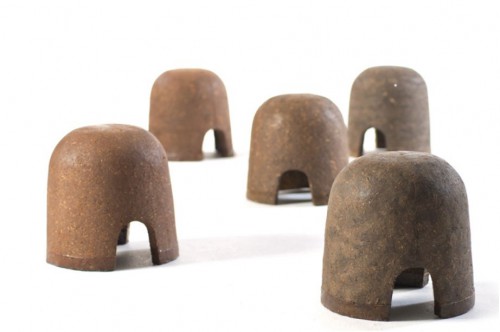
Terra Bio Furniture: simple and super-sustainable stools from the Tel Aviv-based designer Adital Ela. Looking like mud-covered beehives or chocolate bollards, the stools are made of compacted earth, construction debris and organic wastes like spent agricultural fibers and cow flop. Despite requiring little energy to fabricate (mostly elbow grease), their shape makes them strong enough to support quite copious rumps. And if they do break or you get bored of them, you can just wet the material and reuse it to sculpt new furniture.
Ela’s long been interested in products that promote sustainability and community empowerment, like a rainwater-collection funnel that neighbors can socialize under and a line of recycled-textile accessories meant to economically support a refugee camp. For “Terra Bio Furniture,” she challenged herself as a “designer-gatherer” by building chairs and lampshades with environmental ingredients that most people would consider worthless. The first step was finding all the waste material and mixing it into a sticky, grassy sludge. She pressed this stuff into molds and applied pressure – sometimes by standing on it – allowing it to harden into domed bricks.
She then shined the objects with flax oil, bottomed them with latex to prevent slippage and boom, she had herself some stools (in more than one sense of the word). Here’s Ela with a bit more detail on her all-natural furniture:
the objects can be produced anywhere with local earth and agricultural residue, require zero energy, create no pollution and are fully renewable and compostable. the series is developed using a unique compression process that combines indigenous knowledge and contemporary production methods. at the end of its lifecycle the objects can be either re-molded by the user or simply returned to earth. the grey objects for example, are made from left-over earth extracted from a significant archeological site in Jerusalem – creating a unique and rare natural sense and scent to every room.
You can see the bio-stools and shades at the 2013 Milan Design Week.
[via: The Atlantic Cities]